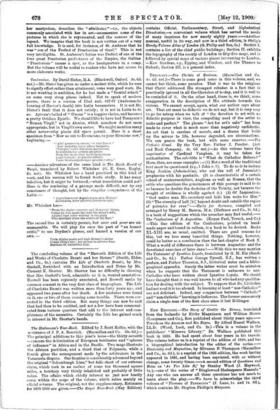THEOLOGY.—Pro Christo at Ecclesia. (Macmillan and Co. 4s. 6d. net.)—There
is some good sense in this volume, and, we cannot but think, some paradox. That it was to the religious that Christ addressed His strongest rebukes is a fact that is practically ignored in all the Churches of to-day, and it is well to be reminded of it. On the other hand, there is, we think, some exaggeration in the description of His attitude towards the vicious. We cannot accept, again, what our author says about art. That art must be didactic we do not say, but it is very easy to go far astray when we talk of " the devotion to art with no didactic purpose in view, the compelling need of the artist to make and perfect." The phrase "Art for art's sake" has been made to cover what is much more than negatively undidactic. An art that is careless of morals, and a drama that holds up the mirror to life, however degraded, are abominations. We can praise the book, but with some reserves.—The Catholic Creed. By the Very Rev. Father J. Procter. (Art and Book Company. 3s. 6d. net.)—As this volume bears the imprimatur of Cardinal Vaughan, it may be taken for authoritative. The sub-title is " What do Catholics Believe ?" Here, then, are some examples :—(1) Not a word of the traditional text must be questioned (e.g.,1 John v.7). To do so is to imitate King Joakim (Jehoiachim), who cut the roll of Jeremiah's prophecies with his penknife. (It is characteristic of a certain school of controversialists, Anglican as well as Roman, that the critic who questions the genuineness of this passage is said to do so because he doubts the doctrine of the Trinity, not because the weaght of evidence is wholly against it.) (2) Of Inspiration: " God makes mau His secretary and bids him write for Him." (3) " The eternity of hell [is] beyond doubt and outside the region of polemics for ever."—Teats for Sermons, compiled and arranged by Henry M. Barron, M.A. (Methuen and Co., 3s. 6c1.), is a book of suggestions which the preacher may find useful.— The Confessions of S. Augustine. (Kegan Paul, Trench, and Co.) —This fine edition of the Confessions, printed on hand- made paper and bound in vellum, is a book to be desired. Books XI.-XIII. are, as usual, omitted. There are good reasons for this, but we lose many beautiful things. Nothing, however, could be better as a conclusion than the last chapter of Book X. What a world of difference there is between Augustine and the devotional exercises of later days !—With this we may mention The Testament of Ignatius Loyola, translated by G. M. Rix (Sands and Co., 3s. 6d.) Father George Tyrrell, S.J., has written a preface, and Father Thurston, historical notes and a biblio- graphical appendix. Surely the latter writer must be mistaken when he suggests that the Testament is unknown to non- Catholics who have written about Ignatius Loyola. We should have thought that it was well known to all who had any qualifica- tion for dealing with the subject. To suppose that Dr. Littledale had not read it is too absurd. In learning at least " non-Catholics " are not deficient. Indeed, any comparison between "Catholic" and" non-Catholic" learning is ludicrous. The former can scarcely claim a single man of the first class since it lost Dellinger.






































 Previous page
Previous page